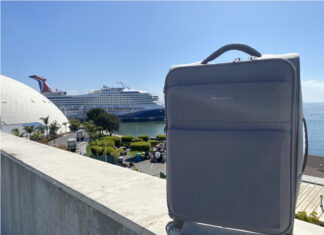Under threat of losing its U.S. port docking privileges, Carnival Corporation this week agreed to pay a $20 million penalty for violating their environmental crimes probation. Carnival Chairman Mickey Arison and CEO Arnold Donald, as well as other Carnival board members, attended the June 3 hearing; their presence demanded by U.S. Federal Judge Patricia Seitz.
Judge Seitz had threatened in April to keep Carnival ships from docking in the United States to punish the company for the violations. She instead accepted an agreement between Carnival and the prosecution that should avoid that fate.
Under the deal, the company pleaded guilty to charges of violating its probation and will pay the $20 million fine, according to the Miami Herald. In addition, it will allow more oversight for the rest of its probation term.
Carnival’s new agreement with federal prosecutors also sets deadlines for creation of an improved compliance plan, with stiff fines (up to $10 million per day) for failure to meet the deadlines. The company also agreed to reduce by 50% its use of disposable plastics across its entire fleet by 2022.
While the agreement was accepted, the judge insisted that Carnival Corporation CEO Arnold Donald, rather than the company representative from Princess Cruises, plead guilty on behalf of the company. She stated, “I still struggle with how to impose a personal liability on top management. Senior management has not had skin in the game.”
Judge Seitz will retire later this year. Future hearings on the case will be heard by U.S. District Judge Ursula Ungaro, who jointly presided with Judge Seitz at Monday’s hearing.
What This Means for Cruise Passengers
Back in April, Judge Seitz threatened to possibly keep Carnival ships from docking at United States ports after they violated their probation orders. Of course, that had the potential to disrupt cruises for passengers.
Cruisers planning or considering a voyage with Carnival were wise to pay attention to the outcome of this hearing. Had the judge not approved the agreement, then there would have been possibility that Carnival ships could be refused docking at some point in the future.
Now with the judge approving the agreement, should Carnival Corporation keep to its word and not violate the terms of the agreement or its probation, then there appears no worry of ships not being able to dock.
Timeline of the Case
If you’re wondering how the world’s largest cruise company found itself in this situation, here’s the background on the case.
December 2016: Carnival pleads guilty to illegally dumping oily waste into the ocean from one of its Princess ships.
April 2017: Carnival begins a five-year probationary period for its environmental crimes. In addition, after conviction in December the company was ordered to pay a $40 million fine. The fine is the largest for such a crime in history, but a small portion of the company’s $3.2 billion in annual profit.
Spring 2019: Federal prosecutors charge Carnival with six probation violations. As the Miami Herald writes, these include: “falsifying records, communicating with the U.S. Coast Guard through a back channel, failing to give enough authority to the company’s environmental compliance officer, improperly preparing ships ahead of visits by a court-appointed monitor, and dumping plastic into Bahamian waters. Details about the sixth incident have not been disclosed.”
April 2019: At what the Miami Herald described as a “heated court hearing,” Judge Seitz threatens to block all Carnival ships from docking at any U.S. port. She also said if she could, she would send Carnival executives to a “detention center for a couple of days” to get their attention for the probation violations.
Carnival’s Reputation Called Into Question
While now resolved, the issues call into question Carnival’s reputation for caring about the environment.
At the April hearing, Judge Seitz referred to her recent experience sailing aboard Carnival’s ultra-luxury cruise line Seabourn. Seabourn gave passengers on that vessel a 45-minute presentation about the damage plastic straws cause to the marine environment. Seitz stated in court, “Obviously they talk the talk, but they’re not walking the walk.”
Carnival Chief Communications Officer Roger Frizzell issued a statement after the hearing: “Our environmental responsibility has been and remains a top priority for the company. Our aspiration is to leave the places we touch even better than when we first arrived. This is in the best interest of our guests, our company and the oceans upon which we travel.”
Earlier this year, Carnival’s industry peers voted for the cruise line to receive the Greenest Shipowner of the Year Neptune Award. The company has also earned media attention for their move toward green-tech ships, with their German brand AIDA debuting the first-ever LNG-powered cruise ship. Carnival Corporation has also ordered LNG-powered vessels for Princess and Carnival Cruise Line.
What’s Your Opinion?
What do you think? Is the agreement fair? Do the company’s recent orders for cleaner ships and their environmental award indicate the company has evolved on environmental issues? Let us know in the comments below.











